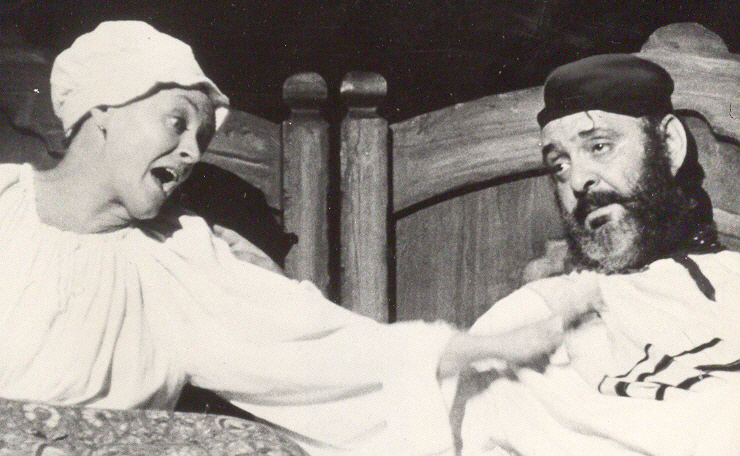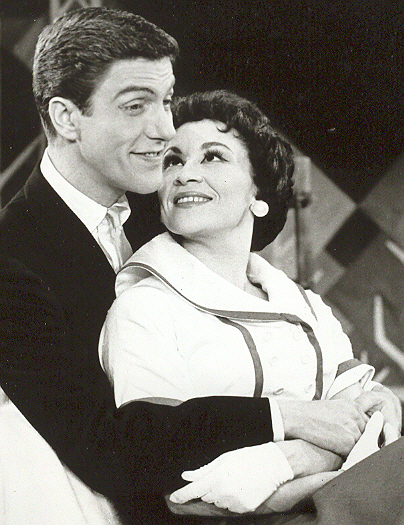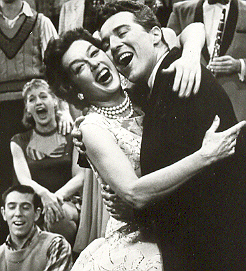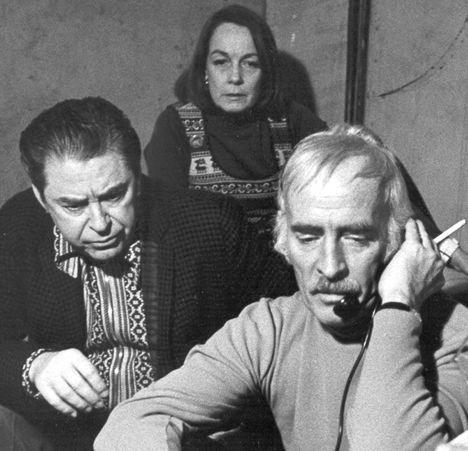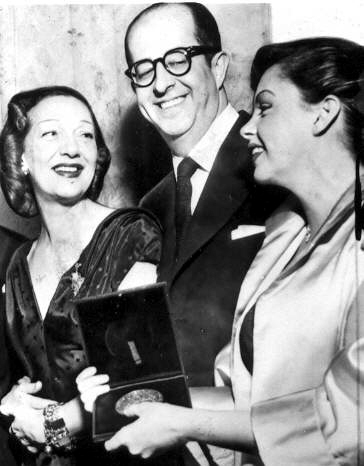George S. Irving, the Tony Award-winning scene-stealer, has been reflecting on his 50 plus years in theater as he prepares for his one-man retrospective George S. Irving - Still Carrying On, which runs Friday-Sunday, June 18-20, at the Lucille Lortel Theatre [121 Christopher Street, between Bleecker and Hudson Streets]. "And one thing for sure," he says emphatically, "theater has changed!"
Irving says that when he came to New York, an energetic 19-year-old from Springfield, MA, "Broadway had legendary glamour. The biggest change is that the great composers are gone - Berlin, Rodgers and Hart and Hammerstein, the Gerhswins, Porter, Loesser. Every year one or the other had a new show. They were giants! Of course, we still have Sondheim, but the economics of today's theatre don't allow a new show every season."
Things have changed for actors as well. "If you showed directors anything at all in the way of professionalism," says Irving, "you could count on working season after season. It's harder today, even getting started. There's not an abundance of work. Nothing is easy anymore, even for the giants currently writing and acting. There were more theaters and shows had moderate, but profitable runs. It wasn't the hit or miss situation we have now."
Irving, 81, traces his career to a Sunday afternoon in Washington, D.C., when he was in the chorus of a touring company of The Student Prince and learned of the attack on Pearl Harbor. He's been in his share of milestone productions: Lady in the Dark (1941), starring Gertrude Lawrence; Oklahoma! (1943); Gentlemen Prefer Blondes(1951), headlined by Carol Channing; and, most recently on Broadway, Me and My Girl.
Lady in the Dark by Moss Hart with music and lyrics by Kurt Weill and Ira Gerswhin, "was the most wonderful thing ever invented," says Irving. "I still think that. Hart, who filled more than his share of analysts' couches, wrote an unusual story about a glamour magazine editor, whose fears and anxieties drive her into psychoanalysis. With its three dream sequences, it was like watching three condensed shows. It was a triumph.
"Irene Sharaff, who found much more fame in films, did the costumes," he continues. "Fashion designer Hattie Carnegie was brought in to do Gertrude's gowns. No expense was spared and it was all quite stunning. The choreography was by the brilliant Albertina Rasch. Moss was a wonderful director. "And what a cast," he still beams with excitement. "Gertrude was the rage. There was wonderful Danny Kaye as this foppish photographer, Victor Mature, Macdonald Carey and Natalie Schaefer, later of Gilligan's Island fame."
Being onstage with Lawrence was an education. "She was in her prime. Watching her was a revelation. She played with great subtlety and skill. Gertie was only a singer of sorts. Her voice was fine for what she had to do, but it didn't have a lot of range. She'd hit a note and it would sort of fade. She was first and foremost an actress. There was no fluff, nothing added. Every gesture meant something. She had this amazing ability to winnow out the crap. She wasn't a company gal, but was very private. Oh, did she have concentration. She was intense that you never wanted to cross her."
Lady had a new bit of technology: a turntable. While one scene played, a drop came down right in the middle. While Lawrence performed in front, the next scene was being set. "It wobbled like a ship in a storm," remembers Irving, "and that drove Gertrude crazy! Once, she was so thrown, she yelled, ëYou're destroying my concentration!' From then on, we had the quietest stagehands and actors! We walked on tiptoes!"
Irving said that although Lawrence was the epitome of a star: chic and well-turned out. "She displayed a hard-as-nails exterior, but was quite vulnerable inside. The only time I saw her really sad was when we did a show on Mother's Day. I stopped by her dressing room. She was all alone and quite upset that her daughter hadn't called."
When Away We Go, the original title of Oklahoma!, opened in New Haven, Irving was in the chorus. "We weren't a success," he recalls, "but no one panicked, nor was there a lot of rewriting. Dick and Oscar had a wait and see attitude. When the new title was suggested, they were reluctant to use it. In Boston, we got the new title and the title song. I still vividly see us sitting on the lobby staircase of the Colonial Theatre learning Robert Russell Bennett's arrangements. The book was strong and there was Agnes DeMille's breathtaking ballet."
No matter, audiences weren't won over. "The show was too radical," says Irving, "but Dick and Oscar knew they were on to something and didn't let anything faze them. They had chemistry. I never saw composers get along so beautifully. It was like they were an extension of each other. I was amazed at how fast they wrote."
Irving says Hammerstein was the most even-tempered man he ever met. "I arrived early for rehearsals at the Boston Shubert. Oscar was at the piano in the grand lounge, then got up and began pacing. He looked up, saw me and said, ëGeorge, excuse me, but I'm trying to get a line. Do you mind?' As I went to leave, everyone else arrived and Oscar realized this was where we were rehearsing. He was very apologetic. ëWill you forgive me,' he asked?"
Does anyone remember Alfred Drake? [Oklahoma!'s original Curley; later the star of Kiss Me, Kate, Kismet]wonders Irving. "He was one of our great stars. He had style and brains. We learned from him. In fact, during the run, he and Howard DaSilva [Judd] held acting classes. When the style of the Broadway musical changed, and more than a song-and-dance leading man was required, Alfred was ready."
Irving met his late wife of 52 years, the prima ballerina Maria Karnilova, when they were in Call Me Mister. "She sort of ignored me for a year," he recalls. "One day I bumped into her as we were exiting the stage door. I got my nerve up and asked her to have dinner with me. I was stunned when she said yes. A great friendship developed. Then love. It took me two years to propose! We had a good life! Maria introduced me to the world of dance and I'm a sucker for ballet."
[The late Miss Karnilova worked with Jerome Robbins, who choreographed numerous ballets for her. She transitioned from dance roles to a show-stopping turn as Tessie Tura in 1959 in Gypsy, which led to Fiddler On the Roof and a Tony Award for Best Featured Actress [though she had the female lead]; and a Tony nomination for Best Actress for her Madame Hortense in 1968's Zorba.]
He said he kept good company during Mister's three-year run on Broadway and tour. "Betty Garrett starred and in our cast was Carl Reiner, William Warfield and Bob Fosse. From the moment I laid eyes on Bob, I knew he was destined for great things. The way that man moved!"
Irving's experience, as well as his stature - he's 6'2" and weighs 200 pounds - helped him build a steady career - 32 shows on Broadway alone including: Two's Company ('51), starring the formidable Bette Davis; Rodgers and Hammerstein's Me and Juliet ('53), featuring Shirley MacLaine in the ensemble; Shinbone Alley ('57) starring Eartha Kitt; Irma La Duce ('60), with Elliott Gould in the ensemble; Bravo Giovanni('62), starring Cesare Siepi and featuring Miss Karnilova and a very young Michele Lee; Tovarich('63), starring Vivien Leigh; George Abbott's short-lived Anya('65), starring Lillian Gish and Constance Towers as Anastasia; with Robert Goulet and David Wayne in The Happy Time('68); Irene ('73), headlining Debbie Reynolds, for which Irving won the Tony for Best Featured Actor; I Remember Mama ('79), playing opposite Liv Ullmann in her short-lived musical debut; On Your Toes ('83 revival); and as Sir John Tremayne in Me and My Girl ('86) opposite Robert Lindsay and later Jim Dale, for which he was Tony-nominated as Best Featured Actor.
In a 50+-year career there must be some regrets. "Yes," he sadly smiles. "Many. My biggest is that I didnët order my life properly. I wasn't smart enough about choosing agents. That made a big difference in my career. I was always determined to learn and the best way to do that is to do everything. I played all kinds of roles in summer stock. As I look back, I can honestly say I've truly been blessed."
Things didn't always go smoothly. "I can think of two well-known men in musical theater, who are still with us, who were a pain in the ass!" Gentleman that he is, Irving wouldn't name names, but he had other recollections of actors he worked with:
GEORGE ABBOTT - "He wasn't a man of great originality, but he was an amazing craftsman when it came to knowing how to stage a scene. He knew when to make it funny. He was a terrific play doctor and a fiend for clarity! He demanded perfect diction from all the actors. He'd sit out front and yell, ëI don't hear ya!' That was because he didn't hear well! He had a wonderful trait as a director. If things didn't go right, he rarely blamed the actor. He'd say, ëI haven't got that quite right, have I? Let's try that again.'"
CAROL CHANNING - "An original! She was a youngster in 1950, but savvy and intelligent. I can still see her standing in the wings, her mouth wide open, applying her lipstick." Irving opens wide, grabs a grease pencil and makes wild, wide circles around his lips. "Carol was a kook, but adorable. You could tell, she lived to be out onstage and she was an extraordinary performer. And she exuded magic. She had a nice pedigree, being related to the Channings of Boston. Thankfully, she was a strong cookie. It had to be tough on her, being so young. Suddenly, she was the toast of Broadway. She managed, and never once let an audience down.
BETTE DAVIS - "Two's Company was a troubled production to begin with. To make matters worse, she and Jerry Robbins didn't get along. They were guarded with each other and clashed if they merely looked at each other. You had two taskmasters, each afraid of the other. He'd give her some movement and if she didn't get it right away, he'd say, ëYou're not a dancer. How can I stage a number when you can't do it?' She'd flare, ëWhat do you mean, I can't do it?' She was high strung and would storm off and scream the place down. Often, we didn't know if we were coming or going. Listening to the commotion wasn't conducive to morale, but it was fascinating. After her years in film, Bette didn't find it easy doing a sustained stage performance, especially one with singing and dancing. Maria [Irving's wife] was in the show. We had a long try-out on the road, so we brought along the kids, who played with her daughter. When I got to know Bette on a personal basis, I adored her. It was a poor man, indeed, who ever thought he could get something over on her."
JIM DALE - "When he came into Me and My Girl, he elected not to imitate Robert Lindsay. Jim was so stylish and smart that he created a new character that was perfect. He's a remarkably talented man and a marvelous actor I greatly admire. We know him mostly for his musical work, but he's a fine dramatic actor, as his recent work in the revival of Comedians proved."
KITTY CARLISLE HART [who later joined the cast of On Your Toes] - "Oh, my. A great beauty, still after all these years. And, in addition to being a great talent and absolutely charming, she has a great heart and great intelligence. What a dynamo! Working with her, Natalia Makarova and all those wonderful dancers was heaven. It was one of George [Abbott]'s last shows. He was 96, almost deaf, but he still had it."
EARTHA KITT - "An intense young woman and very self-assured. A quick learner. She performed with wonderful precision."
VIVIEN LEIGH - "A marvelous actress and beauty. A hard worker, and quite the prankster. In our Tovarich curtain call, we'd come out and then Vivien and Jean-Pierre Aumont would regally come out and we'd all bow. Once, I looked down and there was this note attached to my shoes: "Can you come to dinner tonight, darling? By the way, if you can read this, you're bowing too low." Unfortunately, the show came at a very difficult time for Vivien. She'd been plagued for years with illness. She had tuberculosis and was not physically strong. Certainly not strong enough to carry an entire show. Well into the run, she informed the producers she needed time off. They pleaded with her, saying business was just building. She stayed, and ultimately had a breakdown and had to leave."
DEBBIE REYNOLDS - "She was kind and easy to work with. What I admired most about Debbie was that she'd try anything. The boys throwing her around, whatever, nothing fazed her. She was a good dancer and had a strong body. She loved doing the physical comedy. I was amazed at her knowledge of the business. She confided one day that when she was under contract to M-G-M and wasn't working on a picture, she'd come to the studio and take dance classes, hang around the hair room to learn how to do hair and how to dress the wigs. That's how she learned the craft."
Is there an actor he regrets not having the opportunity to work with? "I've always felt that James Earl Jones is, if not the best, the first among equals. And Olivier. Jones in The Great White Hope and Olivier's The Entertainer were the highlights of my theatergoing life."
Irving was quick to sum up what's made him employable all these years, "I'm good at clarity onstage. I've always considered acting barely an art. It's a craft. It's like storytelling. You have the kids sitting there with their mouths open and you know the story and they don't. It's your job to tell it to them so they don't fidget."
If he taught acting classes, the first lesson he would be: How To Keep the Audience Awake. "Like every actor, I've seen people, even in the front row, asleep. But who can blame them? They get up at six, go to work, have a big lunch and, when they get off, have dinner, maybe with a couple of drinks. By the time they get seated, they're tired. I make sure the audience hears and understands every word I say. If they're not sure what's happening or what's being said, they'll drop off. And once you lose them, it's impossible to get them back."
When Jim Dale, now co-starring Off Broadway in Address Unknown, was asked what makes Irving the ultimate pro, he said, "There's nothing worse than being onstage with someone who hasn't had the experience to cope with things that inevitably happen in a big show [such as Me and My Girl]. We need to have our you-know-whats covered. You want to be surrounded by people who know what they're doing. George is one of those. He's knows very well, indeed, what he's doing and what you're doing! I was always in great admiration of him. Nothing could throw him. If I blew a line, he prompted me. He knew the entire show! Bundled inside George is the theater professional's professional. He knows all you need to know and you learn so much just being around him."
It's obvious that as much as the stage loves Irving, Irving loves the stage. "There's something about getting out there that's therapeutic. You come in feeling poorly and you walk onstage and suddenly you're transported, you're lifted off the ground. Aside from the artistic endeavor, it's like shock treatment. You transform yourself. It's all about process: you train, you learn, you do it. When it comes time for your cue, no matter how you're feeling, you grab yourself by the scruff of your neck and throw yourself on!"
[Performances of George S. Irivng - Still Carrying On, directed by two-time Tony and Drama Desk-winning choreographer Donald Saddler, are Friday, 8pm; Saturday 4 & 8; Sunday 3 & 7. Tickets: Friday, $35; Saturday, $40. $10 student rush tickets available 30 minutes before each performance. To order: TeleCharge: 212-239-6200; on the web: www.telecharge.com ]
--------
